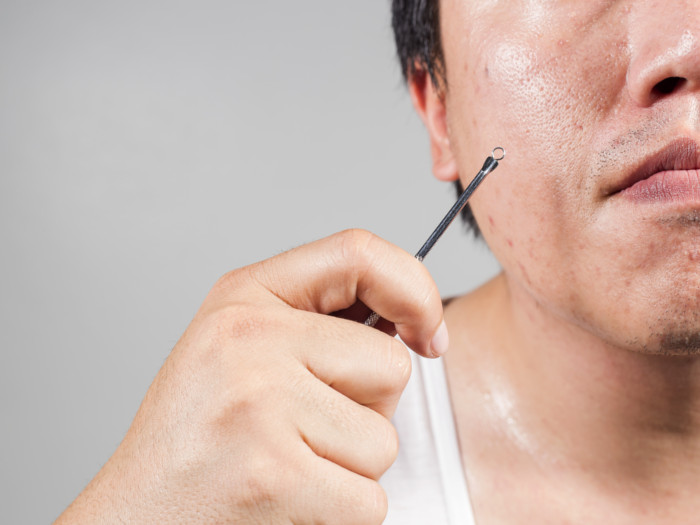Coconut oil can clog pores in some people, particularly in those with large pores on their face, who often suffer from blackheads, as well as those with naturally oily skin. However, even for people like these, coconut oil can be beneficial when used properly to eliminate acne, clear up the inflamed skin, moisturize the face, and prevent other infections and irritation.
Coconut Oil for Skin
People around the world use coconut oil to help their skin due to its high levels of beneficial fatty acids, vitamins, nutrients, antioxidant compounds, and minerals. This oil is primarily composed of medium-chain fatty acids, namely lauric, capric and caprylic acids, all of which can penetrate the skin with natural antibacterial, antiviral, and anti-fungal effects. This is in addition to vitamin E and K (source: USDA), as well as other antioxidants and nutrients that can stimulate blood flow, promote the regrowth of new cells, protect against oxidative stress, stimulate collagen cross-linking, and improve the appearance of lines, wrinkles, and blemishes. [1] [2]
Therefore, it is no surprise that coconut oil is one of the most popular ingredients in many cosmetic and natural health treatments for the face and skin. That being said, many people also propose coconut oil as a miracle cure for acne, which is a condition that affects millions of people around the world. Other people complain that the use of coconut oil can actually make this painful and unsightly condition worse.
Acne occurs when the pores become clogged by dead skin cells and oil, which prevents the release of sebum from the sebaceous gland attached to every hair follicle (pore). When those pores are blocked by excessive amounts of sebum, Propionibacterium acnes begins to develop. Your immune system detects this bacterium in the follicle and sends white blood cells, generating an inflammatory response, manifesting as whiteheads, blackheads, pimples, and the red, blotchy symptoms of acne on the face. Considering that information, the idea of spreading more oil on the skin does seem a bit strange, and yet, many people report coconut oil as being extremely effective in countering acne. [3]

When pores are clogged, it can result in blackheads, whiteheads, and acne. Photo Credit: Shutterstock
Does Coconut Oil Clog Pores?
Coconut oil can clog the pores, but if you use this oil wisely, combined with other face-cleansing techniques, the long-term benefits will be worth the short-term struggle with acne and oily skin. As you may know, not all oils are created equal; similarly, some fats are good and others are bad.
When it comes to your pores, if you are suffering from blackheads, whiteheads, and pimples, coconut oil can definitely help clear up your problem. What helps is exfoliating your skin first, and trying to clear off as much oil as possible before applying this beneficial oil to the same area of skin. [4]
Medium-chain fatty acids are quite small, meaning they are better able to permeate the skin and work quickly on the deeper layers where bacteria may be operating and wreaking havoc on your face. The antibacterial effects of these acids, particularly lauric and caprylic acids, can directly neutralize the bacteria that is causing acne in the first place. The vitamin E found in coconut oil can also moisturize the dry, irritated skin, strengthen the dermal tissue, and stimulate the regrowth of healthy, undamaged cells. The antioxidant effects of coconut oil can prevent oxidative stress, promote the healing of scars from acne and make it more difficult for acne-causing bacteria to return. [5]
However, some people are more susceptible to acne and clogged pores than others. Some people have naturally larger pores, which are more prone to becoming clogged; other people have sensitive skin, so even the smallest clogs can cause inflammation and breakouts. Again, if you try to exfoliate the skin first, using any number of at-home methods, such as a sugar scrub, can help the coconut oil be far more effective when it is eventually applied. [6]
The type of coconut oil you use will also have an effect on whether it clogs the pores or not. Always use virgin organic coconut oil, as it is pure and does not contain any other chemicals or hexanes that can make your skin condition even worse, and further clog your pores. Normal, refined coconut oil (which is inexpensive, and a common choice for people trying to save money) will be comedogenic, meaning that it will clog pores. [7]
Finally, you must be patient with this type of treatment. Coconut oil can permeate deep into the skin in order to expel the toxins, bacteria, dirt, and oils that are causing your pimples or breakouts, but this “cleaning house” can also cause a short period where your inflammatory symptoms will worsen. If you wait and continue to moderately use virgin organic coconut oil, you will soon see a reversal of these symptoms, meaning clearer and healthier skin that is better protected against future breakouts. [8]
In summary, while coconut oil can clog pores for some people and may result in a worsened condition, with proper exfoliation, hygiene, application and patience, the beneficial effects of coconut oil can be enjoyed, leaving your face looking younger and healthier than ever!
